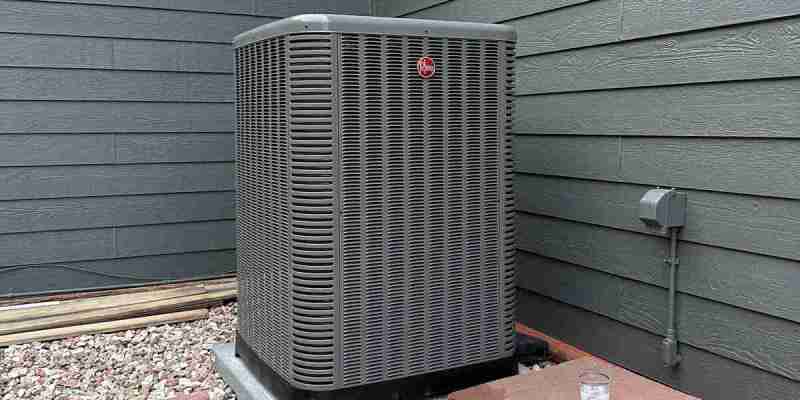JC Mechanical LLC is Denver, CO’s trusted heating and cooling company—call us to learn more about your blower motor, HVAC system, and anything else you’d like to know.
Few parts are more important to efficient HVAC systems than blower motors. They help heaters and air conditioning units distribute air throughout your home so you can stay comfortable through every season. But how long do HVAC blower motors last for a typical home system in Denver, CO?
To answer this question, JC Mechanical LLC shares everything you should know about HVAC blower motors and their expected lifespan below. The team has provided reliable air conditioner repair in Denver, CO, for over 30 years and can handle any heater or air conditioning project you throw their way.
What Is an HVAC Blower Motor?

HVAC blower motors allow heating and cooling systems to disperse warm or chilled air. They utilize belts that spin the unit’s fan blades, pushing the air into your property’s ductwork and through the vents to keep your home comfortable year-round. Although several heaters and air conditioners utilize blower motors, they are most common on furnaces.
Furnace blower motors don’t just distribute warm air throughout your home; they also dictate how fast the system heats up. An optimal blower motor will heat up the furnace very quickly, allowing it to spread warm air without delay. And the faster your furnace warms and distributes the air, the lower your energy costs will be.
Elements That Affect an HVAC Blower Motor’s Lifespan
The only thing separating the unit’s blower motor from untreated outdoor air is the unit’s air filter. This position leaves it exposed to excessive moisture, pollutants, and corrosive elements that can adversely affect the motor’s performance and decrease its longevity. Since HVAC blower motors are more vulnerable to harsh conditions than other internal parts, they need proper care.
Most blower motors feature small brushes that experience significant wear and tear over time, reducing their efficiency. They are also prone to overheating if the unit doesn’t have proper airflow. If you add in malfunctioning belts and various other mechanisms, blower motors are likely to give out prematurely.
The Average Life Expectancy of HVAC Blower Motors
So, how long do HVAC blower motors last with proper maintenance? It depends on the unit itself.
For example:
- Air source heat pumps have the lowest blower motor life expectancy, with most breaking down after 10 to 12 years (although some last up to 15 years with proper maintenance).
- Direct expansion cooling air conditioners last a bit longer. Most reach 15 to 20 years before requiring a replacement.
- Furnace blower motors, the most common variety, have a lifespan of 10 to 20 years.
The best way to preserve your HVAC blower motor is to hire a professional technician to service your system regularly. Experienced technicians like JC Mechanical LLC will assess your system and repair any faulty mechanisms before they negatively impact your furnace or air conditioner.
Scheduling professional HVAC maintenance at least once a year should prevent blower motor issues and extend your unit’s useful life.
Signs of a Broken or Failing HVAC Blower Motor

Most broken or failing blower motors exhibit warning signs before they give out entirely. Addressing these indications early will help you fix your blower motor before it jeopardizes the whole unit.
Below are common signs that your HVAC blower motor needs urgent professional attention:
Screeching or Grinding Noises
Furnace blower motors retain lubrication for several years, allowing them to operate smoothly and quietly. However, sometimes the motor bearing can damage the gears to produce loud screeching and grinding sounds.
If you notice loud or strange noises coming from your furnace, contact a professional heating and cooling company like JC Mechanical LLC for immediate service.
Irregular Operation
Sometimes internal malfunctions cause furnaces to operate intermittently; they function correctly sometimes but not always. They may even be performing optimally one minute and cease operations altogether in the next. This typically indicates a blower motor issue, but it can also stem from numerous other internal problems, such as:
- Dirty or clogged air filters
- Broken wires
- Inadequate voltage supply
- A broken capacitor or limit switch
Before contacting a repair company to fix your unit, use a multimeter to test the limit switch and clean the motor’s wire coils. If the issue persists, you likely have a broken furnace blower motor.
Burning Smells or Unusual Odors
Many furnaces produce a burning smell or unpleasant odors when they experience a blower motor problem. The foul smell can quickly overtake your home, so it is best to act quickly.
If you notice a strange burning smell coming from your furnace, check the blower wheel, motor, and assembly for damage. If you don’t see anything, you may just need to clean your furnace. However, it is best to check with a professional.
Dusty or dirty furnaces can sometimes discharge burning smells as they heat up. Cleaning the furnace and changing the air filter might resolve the issue. If the odor remains, you’ll most likely need to address a blower motor issue.
Stops Working After Several Hours of Operation
How long do HVAC blower motors last when a furnace is showing signs of overworked capacitors or overheated limited switches? Not long.
These issues can force a furnace to shut off after several hours of optimal operation. This problem differs from irregular operation since it doesn’t happen throughout the day. Instead, the unit will function correctly and suddenly switch off; it won’t turn back on for several hours.
Excess dust and debris within the blower assembly is one of the primary causes of overheating/overworking. The dust restricts airflow inside the blower assembly, causing it to overheat. Use compressed air and a cloth to eliminate dust within the assembly and restore the unit’s performance.
Should You Purchase a New Furnace or Replace Your Unit’s Blower Motor?

Figuring out whether you should replace your furnace’s blower motor or upgrade to a new-and-improved model isn’t always straightforward. But your system’s age is a helpful indicator.
Older models are less efficient and more prone to breaking down. Replacing a broken blower motor might seem more cost-effective at first, but this often provides a temporary fix. Blower motors can last throughout the furnace’s lifespan if properly maintained, so a failing motor frequently indicates an outdated unit.
That’s why it’s often better to replace your unit once it reaches 15 to 20 years old and experiences a significant problem. The decision could even help you save money on frequent repairs and future electricity bills. Newer furnaces are more energy efficient, as they don’t require as much power to heat your home compared to older technologies.
Is your furnace over 15 years old and experiencing a blower motor issue? It’s far better to replace the unit than repair it!
Contact JC Mechanical LLC for Outstanding Professional HVAC Services in Denver, CO
How long do HVAC blower motors last once your system begins to experience a furnace blower motor issue or something similar? Find out more from the heating and cooling experts at JC Mechanical LLC. Our technicians will repair your HVAC blower motor or upgrade your home comfort with a brand-new system at a price that won’t break the bank.
From professional AC installation to furnace repair, no job is too big or too small for JC Mechanical LLC. Call the team at 720-807-8953 today to see what our experienced technicians can do for you in Denver, CO, today!
Author Bio:
Jimmie Ciccone
Owner of JC Mechanical Heating & Air Conditioning. A small family-owned company with over 30 years of experience dedicated to providing the best service possible to our customers. They guarantee 100% customer satisfaction, and if you aren’t satisfied, then you don’t pay them a dime.
